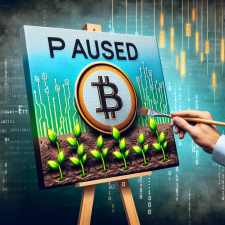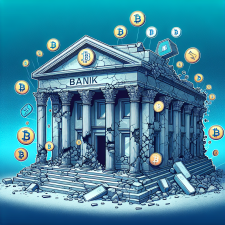Known for his skepticism of cryptocurrency and blockchain, Paul Krugman is a Distinguished Professor at the City University of New York Graduate Center and a Nobel laureate in Economic Sciences. His insights are regularly shared in the New York Times.
Holding a strong stance against the adoption and use of Bitcoin and cryptocurrency, Paul Krugman is a well-respected and award-winning economist. His op-eds, filled with compelling and concerning arguments, find support from skeptics while sparking contention among cryptocurrency advocates and investors.
Nobel laureate economist Paul Krugman has consistently expressed his disdain for Bitcoin and the broader cryptocurrency landscape. He argues that these digital entities lack economic utility and their valuation is fraught with uncertainty. While prominent voices challenge Krugman’s standpoint, the debate over whether Bitcoin is indeed a bubble continues.
Krugman’s critique of cryptocurrency is deeply rooted in his extensive background in economics, reflecting years of study, teaching, and expertise.
A consistent theme in Krugman’s commentary since 2018 is his view that Bitcoin and blockchain technology represent a regression to monetary practices of 300 years ago when gold dominated exchanges. This opinion was solidified during his European vacation, where his reflections on the subject remained unchanged. Three years later, he reiterated his stance:
“The relevance of Bitcoin and its ilk to the economy is negligible since they have failed to carve out a significant economic role.”
In his 2018 New York Times op-ed entitled “Transaction Costs and Tethers: Why I’m a Crypto Skeptic,” Krugman posed the critical question:
“What unique problems does this technology solve? How does it outperform existing, simpler technologies?”
Transaction Costs Analysis
Gold’s high transaction costs stem from its bulkiness and storage expenses. While fiat currencies introduce lower yet notable costs due to their physical nature, the evolution to checks and card payments has minimized such expenses further.
This evolution has led to widespread global adoption, fueled by their acceptance, which reduces costs and facilitates practical commerce. In stark contrast, Bitcoin remains hampered by significant transaction costs due to its energy demands and limited acceptance.
According to Wikipedia, the energy consumption of Bitcoin mining is estimated to rival the power usage of entire small countries, raising further concerns about its sustainability.
Tethering Challenges
Bitcoin faces significant challenges in providing stable tethering. Unlike paper money, which is bolstered by government backing, or gold, which has practical uses in industries and jewelry, Bitcoin lacks such foundational support.
Its digital and stateless essence means Bitcoin has no physical usage or central authority certifying its viability as currency. Krugman notes, “A collective doubt among speculators regarding Bitcoin’s value could render it worthless overnight.”
Krugman expanded on this notion in a June 2021 op-ed, noting that stablecoins such as TerraUSD initially aimed to exclude third parties but ultimately needed them for stability. TerraUSD’s de-pegging from the dollar and demise underscored the necessity of holding equivalent currency or asset value for genuine stability.
Absence of Hard Evidence Against Critiques
In recent op-eds, Krugman stands firm on Bitcoin’s speculative nature, calling it a bubble or scam constructed by those misunderstanding fiat currency fundamentals. Responding critics often rely on what he terms “technobabble,” lacking solid rebuttal evidence. His key criticisms include:
- Ponzi and pyramid schemes thrive on strong narratives, a domain where crypto excels.
- Bitcoin’s promise as an inflation hedge has proven unfounded.
- Most investors access cryptocurrencies via exchanges, which manage their funds and keys, countering the trust-free ethos of cryptocurrency.
- The cryptocurrency paradigm depends on institutional and individual reputations for its status.
Understanding the Bubble Hypothesis
Krugman has consistently labeled Bitcoin as a bubble. In 2018, he remarked that its rising prices were a classical bubble sign: early investors profit, attracting more participants until reality or a lack of new entrants ends the cycle abruptly.
Paul Krugman’s academic accolades are impressive, with a Nobel Prize recognizing his analysis of how economies of scale impact global trade among similarly situated countries. He also boasts a Ph.D. in economics from MIT and a bachelor’s degree from Yale.
His achievements extend to various prestigious awards, including the Nobel Memorial Prize in Economic Sciences, the John Bates Clark Medal, the Adam Smith Award, the Howland Memorial Prize, and the H.C. Recktenwald Prize in Economics from the University of Erlangen-Nuremberg.
The insights expressed in this article are for informational purposes. For further details, refer to our guidelines. As of this writing, the author holds small amounts of bitcoin and litecoin.







